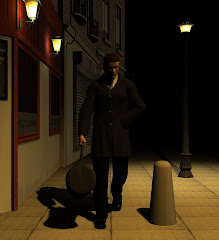When The Guardian recently polled possible future leaders of the Labour Party about the Iraq occupation, some surprising divergences emerged. Not in what they said, which was all pretty much what you'd expect, but in how they said it.
The biggest contrasts were between Peter Hain, Northern Ireland Secretary, and John Reid, Home Secretary. Hain's replies were multi-sectioned wonders. They weren't that badly phrased but they just never ended. On the issue of when British troops should withdraw from Iraq, for example: "We should bring our troops home as soon as the situation on the ground allows and not stay a day longer than is needed to enable a safe handover to the Iraq people and their democratically elected government."
And that was before he started squirming. Asked if an enquiry about the war should be held after Tony Blair leaves office, he really lets go. I won't quote his last sentence in full. But it's got over 60 words and turns, apparently spontaneously, into an epic saga detailing all Blair's achievements in office. It's no wonder Hain has been a success in Northern Ireland. Sinn Fein and the Ulster Unionists must agree to anything just to shut him up.
John Reid, meanwhile, simply answers "No" to three of the five questions. Even when he bothers with actual sentences there are mitigating circumstances. Saying "when the time is right" in response to the British withdrawal seems uncharacteristically chatty. But he was actually just repeating one of the three options given in the question. Effectively his answer was "Box C please, Noel." As for claiming "I cannot answer a hypothetical question" when asked if he would support a future military strike on Iran – well, it's hard to see how this could have been phrased more concisely. "That's a hypothetical question" would raise the rebuttal "So what?" "I don't know" was what he was really saying, but that would make him look at fault rather than the interviewer. And Reid is a master at transferring the blame.
Opinions will vary on whether he appears succinct or arrogant, whether Hain comes across as an intellectual or a windbag. But I can guess who's won the support of your standard lazy journalist. Reid has given them some neat soundbites in the past, mainly about how bloody awful his Home Office is. If he gets into Downing Street, though, they may have to put in some effort to fill their column inches. With Hain, they'll just have to switch the microphones on and sit back.
The biggest contrasts were between Peter Hain, Northern Ireland Secretary, and John Reid, Home Secretary. Hain's replies were multi-sectioned wonders. They weren't that badly phrased but they just never ended. On the issue of when British troops should withdraw from Iraq, for example: "We should bring our troops home as soon as the situation on the ground allows and not stay a day longer than is needed to enable a safe handover to the Iraq people and their democratically elected government."
And that was before he started squirming. Asked if an enquiry about the war should be held after Tony Blair leaves office, he really lets go. I won't quote his last sentence in full. But it's got over 60 words and turns, apparently spontaneously, into an epic saga detailing all Blair's achievements in office. It's no wonder Hain has been a success in Northern Ireland. Sinn Fein and the Ulster Unionists must agree to anything just to shut him up.
John Reid, meanwhile, simply answers "No" to three of the five questions. Even when he bothers with actual sentences there are mitigating circumstances. Saying "when the time is right" in response to the British withdrawal seems uncharacteristically chatty. But he was actually just repeating one of the three options given in the question. Effectively his answer was "Box C please, Noel." As for claiming "I cannot answer a hypothetical question" when asked if he would support a future military strike on Iran – well, it's hard to see how this could have been phrased more concisely. "That's a hypothetical question" would raise the rebuttal "So what?" "I don't know" was what he was really saying, but that would make him look at fault rather than the interviewer. And Reid is a master at transferring the blame.
Opinions will vary on whether he appears succinct or arrogant, whether Hain comes across as an intellectual or a windbag. But I can guess who's won the support of your standard lazy journalist. Reid has given them some neat soundbites in the past, mainly about how bloody awful his Home Office is. If he gets into Downing Street, though, they may have to put in some effort to fill their column inches. With Hain, they'll just have to switch the microphones on and sit back.
